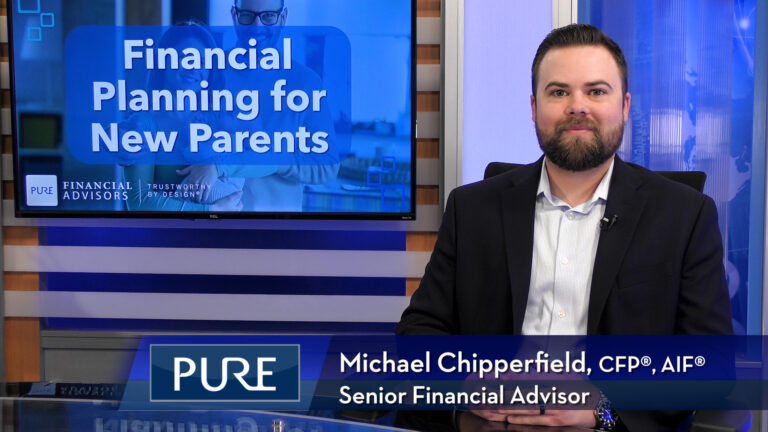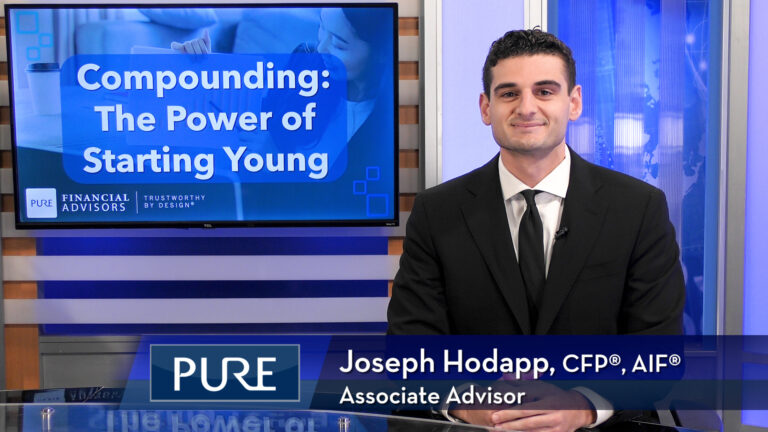Have you wondered about the acronyms that come after a financial professional’s name? Pure’s Financial Advisor, Alex Valles, CFP®, AIF®, not only deciphers but clarifies two prevalent designations – CFP® mark and AIF® – shedding light on their important role in selecting an advisor you can trust.
FREE GUIDE | Investing Basics Guide
Transcript
Today, we’re diving into the world of financial planning and exploring the significance of designations.
Financial Advisors at Pure hold professional titles that demonstrate experience. Some of these titles include CERTIFIED FINANCIAL PLANNER™ professionals, Certified Public Accountants, and Chartered Financial Analysts, as well as Accredited Investment Fiduciary.
Today we will focus on what it means to be a CFP® or Certified Financial Planner professional and what it means to be an Accredited Investment Fiduciary or AIF® .
Well, contrary to popular belief, not all financial advisors are created equal. While anyone can claim to be a financial advisor, only those who’ve completed the CFP® certification process can actually use the marks.
The CFP® credential is owned by the Certified Financial Planner Board of Standards Inc.
To use the CFP® mark or certification, the financial planner must successfully complete the CFP® Board’s comprehensive examination which tests his or her knowledge on a number of key financial planning topics. The individual must also have two to three years of related experience or four to six thousand hours, voluntarily ascribe to the board’s code of ethics, and complete 30 hours of continuing education every two years pertaining to such relevant topics as estate and retirement planning, investment management, tax, and insurance.
An AIF® is a Accredited Investment Fiduciary Designation
Similarly, the Accredited Investment Fiduciary Designation focuses on the investment portion of financial planning. To receive an AIF® designation an individual must meet prerequisite criteria, complete a training program, and pass a comprehensive examination. In addition, six hours of continuing education is required annually to maintain the designation.
The CFP® mark or certification and AIF designation serve as beacons, guiding individuals toward financial planners committed to ethical conduct and competence. Individuals with these designations aren’t just professionals; they’re guardians of your financial well-being. If you would like to meet with an accredited advisor, take advantage of Pure’s free financial assessment and experience the difference.
Subscribe to our YouTube channel.
IMPORTANT DISCLOSURES:
• Investment Advisory and Financial Planning Services are offered through Pure Financial Advisors, LLC, a Registered Investment Advisor.
• Pure Financial Advisors LLC does not offer tax or legal advice. Consult with your tax advisor or attorney regarding specific situations.
• Opinions expressed are subject to change without notice and are not intended as investment advice or to predict future performance.
• Investing involves risk including the potential loss of principal. No investment strategy can guarantee a profit or protect against loss in periods of declining values.
• All information is believed to be from reliable sources; however, we make no representation as to its completeness or accuracy.
• Intended for educational purposes only and are not intended as individualized advice or a guarantee that you will achieve a desired result. Before implementing any strategies discussed you should consult your tax and financial advisors.
CFP® – The CERTIFIED FINANCIAL PLANNER™ certification is by the Certified Financial Planner Board of Standards, Inc. To attain the right to use the CFP® designation, an individual must satisfactorily fulfill education, experience and ethics requirements as well as pass a comprehensive exam. Thirty hours of continuing education is required every two years to maintain the designation.
AIF® – Accredited Investment Fiduciary designation is administered by the Center for Fiduciary Studies fi360. To receive the AIF Designation, an individual must meet prerequisite criteria, complete a training program, and pass a comprehensive examination. Six hours of continuing education is required annually to maintain the designation.













